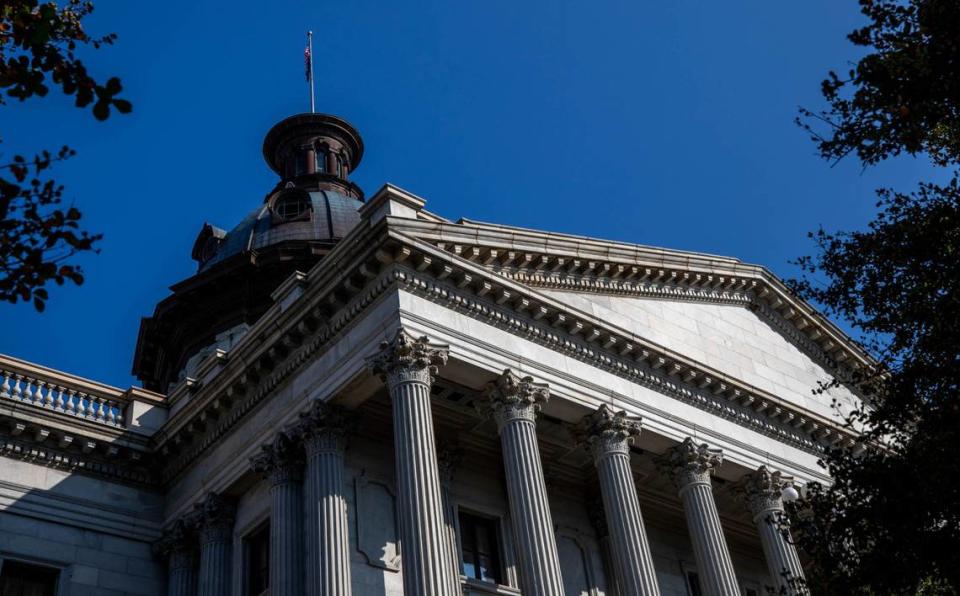SC hate crimes bill advances as some religious leaders call to remove LGBTQ protection

As the hate crimes bill got its first hearing in the South Carolina Senate, some religious groups continued their push against parts of the legislation.
The religious leaders pushed lawmakers Wednesday to remove provisions of the bill that would extend protections for members of the LGBTQ community.
They ultimately failed to convince a panel of lawmakers, made up of two Democrats and three Republicans, but could get more support as the bill moves through the Senate, in which Republicans have a two-to-one majority.
The move is part of a conservative segment of the religious community’s ongoing effort to shape South Carolina’s hate crime bill, which if passed would remove the Palmetto State from the list of just two states without an existing hate crimes law on the books.
In its current form the bill, which lawmakers voted 3-2 to send it the full Judiciary committee Wednesday, would allow prosecutors to seek additional penalties for certain crimes committed against victims targeted for their actual or perceived race, color, religion, sex, sexual orientation, gender, national origin or physical or mental disability. For violent crimes such as murder, assault, armed robbery or criminal sexual misconduct, the penalties could be increased by up to five years imprisonment and an additional fine of up to $10,000.
Currently, South Carolina doesn’t have its own hate crimes law. Instead, prosecutors have to rely on their federal counterparts to pursue hate crime charges under the federal hate crimes law, but that rarely happens except in the case of high-profile crimes.
Some members of the religious community specifically asked lawmakers to remove enhanced penalties for crimes targeting victims based on sexual orientation and gender, arguing that language would create newly recognized protected classes under South Carolina law.
“Bringing a new level of definition of sex and gender into South Carolina code is a concern of ours,” said Dave Wilson, the President of the Palmetto Family Council, adding that he had a letter signed by other religious leaders and organizations echoing his concerns.
S.C. Baptist Convention Public Policy Director Tony Beam said adding definitions for sexual orientation and gender identity into the code could create a slippery slope. While the current hate crimes bill does not contain any provisions related to hate speech, Beam said religious leaders worry that the current bill later could lead to a law used to prosecute Christians, specifically Christian Evangelicals, for talking about their stances on homosexuality and transgenderism.
“Sexual orientation, gender identity is being used to turn believers into people who are portrayed as haters if they uphold to a biblical understanding of sexuality,” Beam said.
“I’m afraid that this will lead to the extension in other areas,” he added.
Subcommittee chairman Sen. Brad Hutto, D-Orangeburg, pushed back on the request to remove sexual orientation and gender identity, explaining that the hate crimes bill would only apply to people who commit violent crimes against people because of their actual or perceived sexual orientation or gender identity.
“For gender identity, is it OK to beat those people up?” Hutto asked.
“We’re against hate that’s based on how someone is, who we are,” Hutto added.
Ultimately, lawmakers opted not to remove the enhanced penalties for crimes targeting people based on sexual orientation or gender.
However, Wednesday’s efforts were not the first time that lawmakers have considered stripping protections for the LGBTQ community. In early March, House members voted to remove those protections in subcommittee, saying the bill could not pass the House in a timely manner with that language included.
In committee, however, Democrats spearheaded a successful push to add LGBTQ protections back into the bill. The bill ultimately passed the full House with no debate.
Religious leaders have been granted many of their requests for changes to the bill as it moved through the state House.
Some religious groups have argued that parts included in early versions of the bill could be used to persecute someone trying to proselytize or preach. Their misgivings about the bill got two sections taken out of it: one section that would have allowed victims of hate crimes to sue their persecutor in civil court and a section that would have allowed the prosecution of harassment, stalking and property crimes.
Democrats specifically pushed back against the removal of the harassment, stalking and property crimes portion of the bill, arguing that most hate crimes that are committed fall under those categories. If those were removed from the bill, they said, judges couldn’t add additional penalties to cases, citing the specific examples of people spray painting racial or ethnic slurs on an African Methodist Episcopal church or a synagogue.
While South Carolina Democrats have been pushing for a hate crimes law for years, the GOP only recently began supporting the bill.
That may be due, in part, to the support of the move from the business community. Pushed to action by the Black Lives Matter protests that exploded across the country last summer, the South Carolina Chamber of Commerce and dozens of businesses began advocating for hate crimes bill passage in December 2020. The bill also has the support of the law enforcement community whose leaders have spoken out in favor of the bill multiple times this year.

 Yahoo Finance
Yahoo Finance 